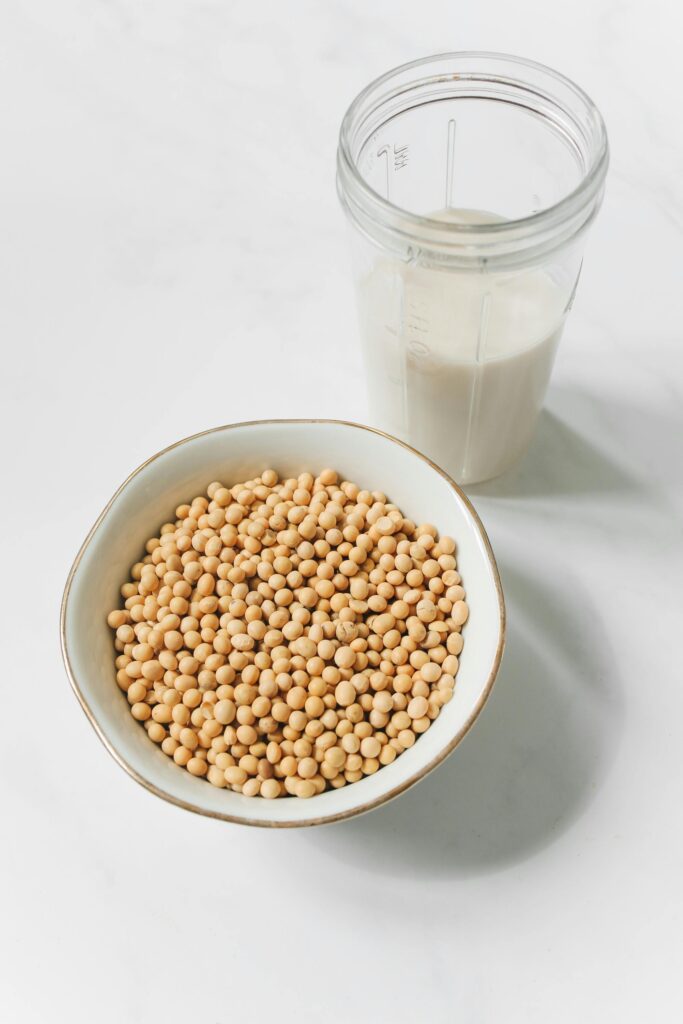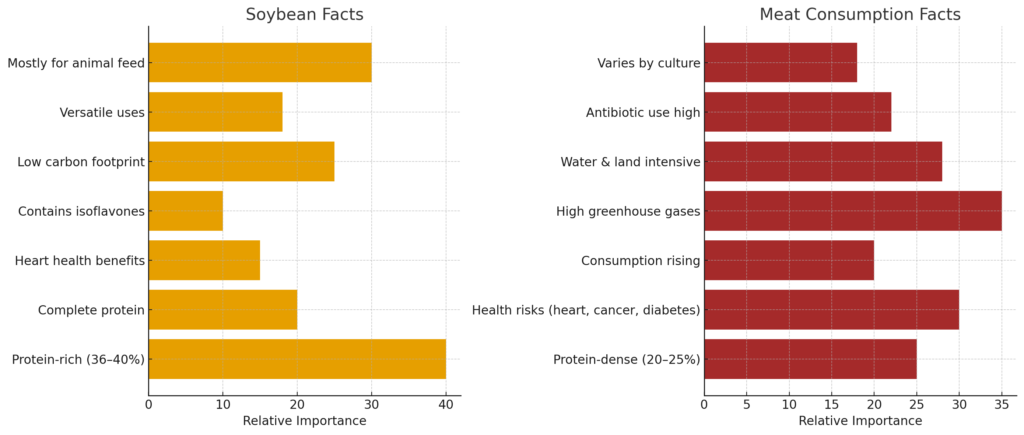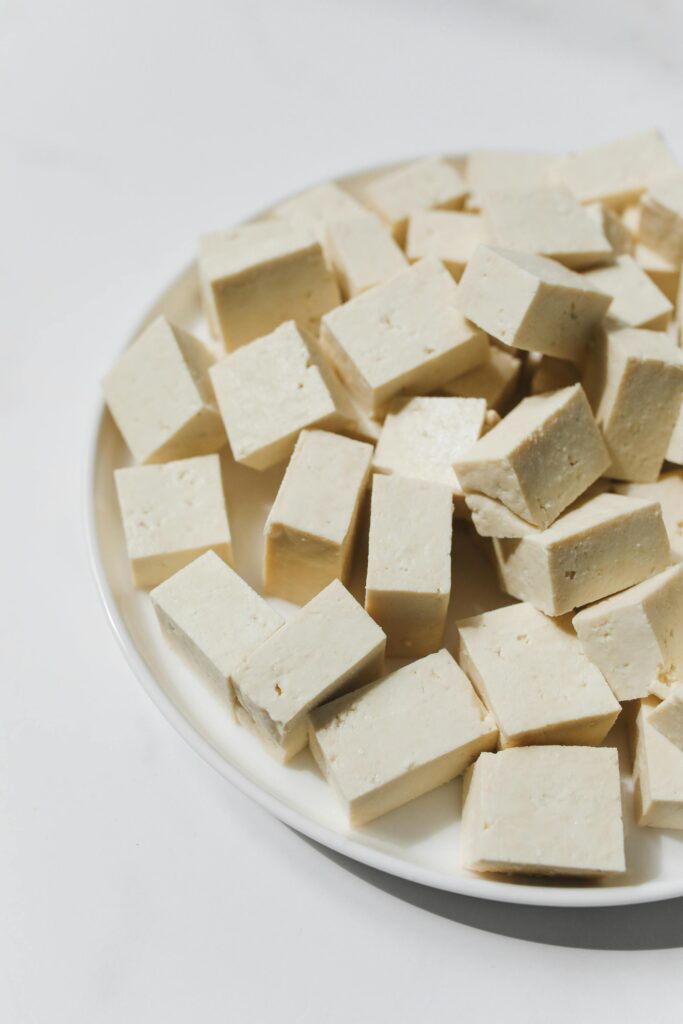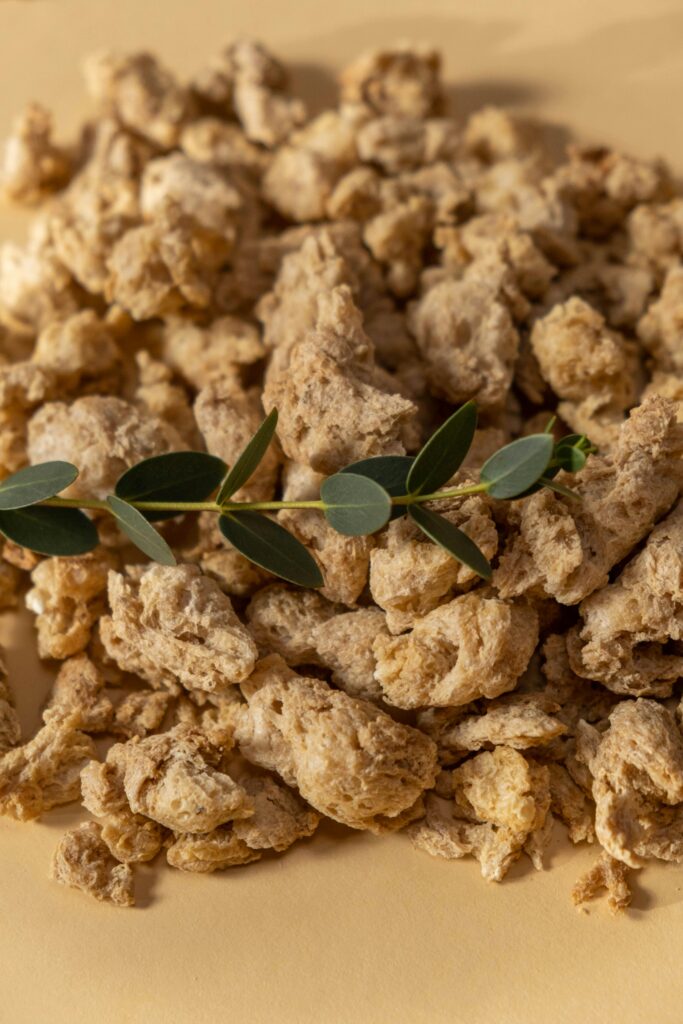
Photo by Polina Tankilevitch
Introduction
Soy has become one of the most talked-about foods in vegan diets. From soy milk in your morning coffee to tofu, tempeh, and soy protein powders, this little bean is everywhere. But with popularity comes confusion — some call soy a superfood, while others fear it may cause hormonal imbalance, cancer, or thyroid issues. Is soy good or bad?
So, is soy good for vegans? Let’s separate the myths from the science and discover the truth about soy’s safety, nutrition, problems and benefits.
Nutritional Power of Soy
Soybeans are considered one of the most nutrient-dense plant foods:
- High-quality protein → Soy is a complete protein with all 9 essential amino acids, similar to meat and dairy.
- Rich in minerals → Provides calcium, iron, magnesium, and potassium.
- Good source of fiber → Supports gut health and digestion.
- Contains isoflavones → Plant compounds (phytoestrogens) with antioxidant properties.
Myths About Soy (and the Truth)
1. Soy acts like estrogen and makes men feminine
Many believe soy increases estrogen and makes men “feminine,” but science disagrees. Soy contains isoflavones (plant-based phytoestrogens), which are much weaker than human estrogen and often block stronger estrogen effects rather than causing them. Research shows soy does not lower testosterone or feminize men. In fact, athletes and bodybuilders use soy protein as a safe, high-quality source of plant protein. For women, moderate soy intake may even support bone health, ease menopause symptoms, and lower breast cancer risk.
2. Soy causes thyroid problems
Partly true. Soy does not harm healthy thyroids, and most people can eat it without problems. The concern mainly applies to those with hypothyroidism or low iodine intake, since soy may slightly reduce iodine absorption, which is needed for thyroid hormone production. The solution is simple: include enough iodine in your diet through iodized salt, seaweed, or fortified foods. With proper iodine intake, soy remains safe and beneficial even for people with thyroid conditions.
3. Soy increases cancer risk
False. Research shows soy does not cause cancer; instead, its isoflavones may actually reduce the risk of breast and prostate cancer. These compounds can help balance estrogen activity in the body, offering a protective effect when soy is eaten in moderation.
4. All soy is GMO and unsafe
Not true. While a large portion of soy grown worldwide is genetically modified, most of it is used for animal feed, not for direct human consumption. For vegans and health-conscious consumers, there are plenty of organic and non-GMO soy products available, such as soy milk, tofu, and tempeh, which are safe and widely accessible.
5. Soyabean Allergy
Yes, it’s true that soy, like many other foods such as peanuts or kidney beans, can cause allergic reactions in some people. However, soy allergy is relatively uncommon in adults and tends to affect only a small portion of the population. For the majority, soy is completely safe and provides excellent nutrition. Just as with any food, tolerance varies from person to person, so while some may experience allergic symptoms, most people — including vegans — can enjoy soy without any issues. (Is soy good)
Benefits of Soy for Vegans

- Complete protein source: Soybeans are one of the few plant-based foods that provide all nine essential amino acids in adequate amounts, making them a true complete protein. They have a high PDCAAS (Protein Digestibility-Corrected Amino Acid Score) of 0.9, which is considered excellent for plant proteins. This makes soy a valuable option for meeting daily protein needs and supporting muscle growth and repair.
- Heart health support: Soy protein has been shown to help lower LDL (“bad”) cholesterol levels while maintaining or slightly increasing HDL (“good”) cholesterol. Regular soy consumption may reduce the risk of heart disease by improving overall cholesterol balance and supporting better cardiovascular health. (Is soy good)
- Bone health: Fortified soy milk and calcium-rich tofu provide an excellent source of calcium and vitamin D, which are essential for maintaining strong bones. In addition, soy isoflavones may support bone density and reduce the risk of osteoporosis, making soy especially beneficial for vegans who do not consume dairy.
- Weight management: Soy foods are versatile and can support both weight gain and weight loss, depending on portion size and preparation. High-protein soy products like tofu, tempeh, and soy chunks promote satiety for weight control, while larger servings combined with calorie-dense ingredients can help in healthy weight gain and muscle building.
- Affordable and accessible: Soy products such as soy chunks, tofu, and soy milk are inexpensive, widely available, and easy to include in everyday meals, making them a practical protein source for vegans around the world.
How to Add Soy to a Vegan Diet
Soybeans are usually harder to digest compared to other beans or legumes. But if you soak them for 8–10 hours, then boil and cook them with oil, water, and spices, they become easier to digest. In a day, you can safely eat about 60–70 g (raw weight) and increase the amount if needed.How to Add Soy to a Vegan Diet. (Is soy good)
| Nutrient | Amount | Key Benefits |
|---|---|---|
| Calories | ~446 kcal | High energy food |
| Protein | ~36.5 g | Complete plant-based protein (all 9 EAAs) |
| Carbohydrates | ~30.2 g | Main energy source |
| Fiber | ~9.3 g | Supports digestion & gut health |
| Fat | ~19.9 g | Contains healthy unsaturated fats |
| Calcium | ~277 mg | Builds strong bones & teeth |
| Iron | ~15.7 mg | Prevents anemia, supports oxygen flow |
| Magnesium | ~280 mg | Important for muscles & nerves |
| Potassium | ~1797 mg | Helps regulate blood pressure |
| Folate (B9) | ~375 µg | Vital for DNA repair & cell growth |
Soy products are made through processes such as fermenting and processing. These methods reduce or remove most of the anti-nutrients, making soy easier to digest and a healthy option to include in the diet.
- Soy milk → Soy milk is one of the most popular plant-based alternatives to dairy. It is made by soaking and grinding soybeans, then boiling and filtering the mixture. Naturally lactose-free, soy milk provides around 7–8 grams of protein per cup, which is higher than most other plant milks. Many commercial brands are fortified with calcium, vitamin D, and vitamin B12, making it a nutritious option for vegans and individuals with lactose intolerance. (Is soy good)
2. Tofu → tofu is one of the famous soy products and a versatile soy product made by curdling fresh soy milk and pressing it into solid blocks, similar to how cheese is made. It is rich in protein, provides all essential amino acids, and is also a good source of calcium and iron (especially when calcium-set). Tofu easily absorbs flavors from spices and sauces, making it a favorite in both savory and sweet dishes for vegans and vegetarians. and its very low in calorie you can easily eat 200g tofu in one meal with other food. (keyword- Is soy good)

Photo by Polina Tankilevitch
| Nutrient | Amount (per 100 g) |
|---|---|
| Calories | ~144 kcal |
| Protein | ~8–12 g |
| Fat | ~8 g |
| Carbohydrates | ~3.9 g |
| Fiber | ~0.3 g |
| Calcium | ~350 mg (varies, higher in calcium-set tofu) |
| Iron | ~5.4 mg |
| Magnesium | ~30 mg |
| Phosphorus | ~147 mg |
| Potassium | ~121 mg |
| Sodium | ~14 mg |
| Zinc | ~1 mg |
3. Tempeh

Photo by cottonbro
Tempeh is a traditional Indonesian soy product made by fermenting cooked soybeans with a natural culture. Unlike tofu, which is smooth and soft, tempeh has a firm, chewy texture with a nutty, earthy flavor. The fermentation process binds the soybeans into a compact cake and also enhances nutrient absorption by breaking down antinutrients. (Is soy good)
Nutritional profile (per 100 g, cooked):
- Calories: ~195 kcal
- Protein: ~19 g
- Carbohydrates: ~9 g
- Fat: ~11 g
- Fiber: ~5 g
- Calcium: ~111 mg
- Iron: ~2.7 mg
- Magnesium: ~81 mg
- Phosphorus: ~266 mg
- Potassium: ~412 mg
Health benefits:
- High protein content: About 19 g per 100 g, making it excellent for muscle growth and repair.
- Gut-friendly: Fermentation adds probiotics that support digestion and gut health.
- Bone support: Contains calcium, magnesium, and phosphorus.
- Better absorption: Fermentation reduces phytates, making minerals more bioavailable compared to unfermented soy.
Uses:
Tempeh can be sliced, marinated, grilled, stir-fried, or crumbled into dishes. Its firm texture makes it an excellent meat substitute in burgers, sandwiches, salads, and curries.
4. Soy Chunks.

Soy chunks (also called nutri-nuggets or soy meat) are made from defatted soybean flour, a by-product of soybean oil extraction. They are one of the cheapest, most convenient, and easily available soy products, especially popular in India. When cooked, soy chunks expand, soften, and develop a meaty texture, making them an affordable protein alternative to meat. (Is soy good)
Nutritional profile (per 100 g, dry):
- Calories: ~345 kcal
- Protein: ~52 g
- Carbohydrates: ~33 g
- Fat: ~0.5 g
- Fiber: ~13 g
- Calcium: ~350 mg
- Iron: ~20 mg
- Magnesium: ~300 mg
- Potassium: ~1100 mg
(After cooking, values per 100 g are lower because they absorb water and expand.)
Health benefits:
- High protein content → around 52 g per 100 g (dry), making it one of the richest plant-based protein sources.
- Budget-friendly → much cheaper than meat, paneer, or even protein powders.
- Weight management → high in fiber, keeps you full, and helps control appetite.
- Heart health → very low in fat and cholesterol-free.
- Muscle gain → popular among gym-goers and athletes as a natural protein source.
Uses:
Soy chunks can be added to curries, pulao, biryani, salads, soups, or stir-fries. They can also be ground into granules to make cutlets, kebabs, or vegan meat alternatives.
📝 Conclusion
So, is soy good for vegans?
Absolutely YES — when eaten in moderation. Every food is healthy in the right amount, and with soy you can safely consume around 25–30 g of protein daily, adjusting a little more or less as per your needs. Soy is a nutritious, safe, and powerful food that busts many myths. It provides high-quality protein, supports heart and bone health, and offers affordable options for those on a vegan journey. Unless you have an allergy or an unmanaged thyroid condition, soy can confidently be included as part of a healthy vegan diet.
And yes, in many areas tofu and tempeh are not easily available. But this can change — when people start demanding these products, shops begin to stock them. First comes demand and then supply follows automatically.
Is soy good and answer clear yes if use in right way.
Soy & Meat FAQs
1. Is Soy Protein Complete Like Meat?
✅ Yes. Soy contains all 9 essential amino acids, making it a complete protein, just like meat.
2. What’s the Difference Between Soybeans and Edamame?
- Soybeans → Mature, harder beans used for tofu, tempeh, soy chunks, and oil.
- Edamame → Young, green soybeans eaten whole; slightly sweeter and rich in protein + fiber.
3. Does Soy Help with Health?
- May reduce LDL cholesterol, support bone health, and ease menopause symptoms.
- Contains isoflavones, which act as mild phytoestrogens.
4. Is Meat Always Unhealthy?
- Lean meat (like chicken or fish) provides high-quality protein, B12, and iron.
- But red and processed meats are linked to heart disease, cancer, and diabetes when eaten in excess.
5. Which is Better for the Planet: Soy or Meat?
- Producing 1 kg beef = ~15,000 liters water + high greenhouse gases.
- Producing 1 kg soy protein = far less land, water, and carbon footprint.
- Most soy worldwide (≈ 70–80%) is grown for animal feed, not direct human food.
6. Can Edamame Replace Meat in Meals?
✅ Yes. 1 cup of edamame (~155g) has about 18–19g of protein, plus fiber, folate, and antioxidants. It’s a great meat-free protein snack or side dish.
Top Soybean Producers (2024 estimates)
- Brazil 🇧🇷 → ~150 million metric tons
- United States 🇺🇸 → ~113 million metric tons
- Argentina 🇦🇷 → ~48 million metric tons
- China 🇨🇳 → ~20 million metric tons
- India 🇮🇳 → ~12 million metric tons
🔹 Together, Brazil, USA, and Argentina produce over 80% of the world’s soybeans.
These are the countries where beef and other types of meat are produced the most in the world. Much of the soy grown globally is not for human consumption but instead used as animal feed. Eventually, these animals are raised and killed for meat.

